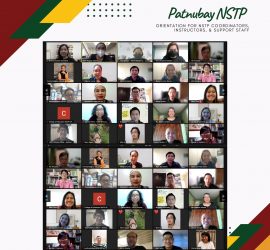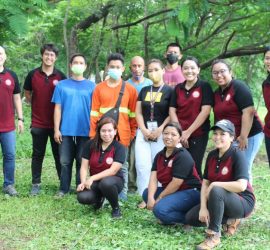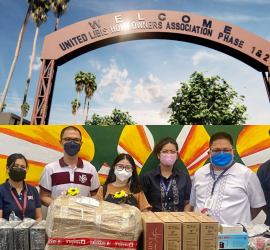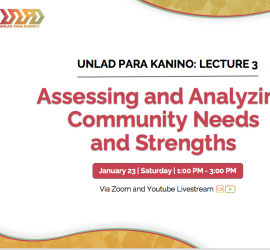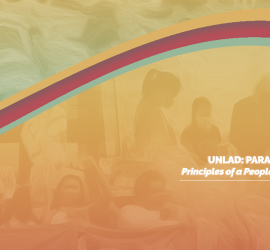The NSTP Diliman Office conducted its first hybrid Strategic Planning Workshop for NSTP Coordinators and the theNSTP Diliman Office on October 23- 25, 2022 at the Gawad Kalinga Enchanted Farms, Bulacan. On the first day of the session, NSTP Director Dennis F. Quilala welcomed the participants present onsite and those who attended via Zoom and discussed the revised NSTP Implementing Rules & Regulations. Deputy Director Likha Minimo presented the NSRC’s activities and initiatives in line with the 2021 Implementing Guidelines and Procedures for NSRC. Deputy Director Minimo also discussed the operationalization of the school-based NSRC unit. The NSTP Coordinators and office personnel toured the Gawad Kalinga Enchanted Farms during the free time of the workshop. This was also an opportunity for the participants to learn more about social entrepreneurship. The tour concluded with a tree planting activity in the farm. On the second day, the two workshop groups presented their findings. The immediate and long-term plans of the implementing units were presented by the DMST Assistant Coordinator, 2LT John Aniciete, and the NSRC-related needs were presented by CAL NSTP Coordinator, Mr. Monfred Sy. After concluding the workshop for the NSTP Coordinators, the NSTP Diliman Office discussed the presentations of the workshop groups and how the Office can assist the units with their NSTP implementation. The NSTP team also discussed projects and programs to be implemented in 2023. By Ma. Regina C. Valerio
NEWS
This year, the Office continues to provide training and webinars to NSTP personnel. The Patnubay NSTP: Orientation for new NSTP Coordinators, Instructors, & Support Staff was held on July 11, 2022, 9:00 AM via Zoom. The orientation was primarily for new NSTP coordinators, instructors, and support staff who will be involved in the implementation of the NSTP in Academic Year 2022-2023. The NSTP Diliman Office facilitates training and seminars every year for NSTP coordinators, instructors, and support staff from 19 colleges and units to ensure proper implementation of NSTP in UP Diliman. Last year, the Office facilitated the “Pangkalahatang Gabay: Orientation for new NSTP Instructors & Coordinators” and the Budget Planning Seminar for NSTP Support Staff. The orientation started at 9:00 AM with Senior Project Assistant for Training & Education, Ms. Ma. Regina Valerio, as host and facilitator. NSTP Diliman Director Dennis Quilala facilitated the first half of the orientation with an introduction of the RA 9163 or the National Service Training Program and its program components. Ms. Valerio continued with a presentation of the policies and guidelines that are used in implementing the NSTP in UP Diliman. The Patnubay NSTP Orientation had 23 attendees: six (6) current and new college coordinators, nine (9) instructors/facilitators, and eight (8) support staff from different implementing colleges and units. The College of Home Economics (CHE) Dean and the Chairperson of the Department of Social Work also attended the orientation. After the orientation, the NSTP Diliman Office provided the attendees with the materials and documents that will help them with the implementation of NSTP in UP Diliman this Academic Year 2022-2023. By Ma. Regina Valerio
The NSTP Diliman Office with the assistance of the Campus Maintenance Office (CMO) launched a tree planting activity on the grounds of the UP Diliman College of Mass Communication on June 6, 2022. CMO Director Perlita Raña designated the tree planting site and provided the guidelines for tree planting in UP Diliman. Ms. Olivia B. Indaya, Landscaping Supervisor, supervised the session on-site. Memorandum No. CAS-12-038 states that the seedlings to be planted must be endemic and indigenous species to firmly discontinue the use of exotic species. Exotic species are invasive that disrupt and harm the existing ecosystem. Narra seedlings were planted in compliance with the memorandum and were procured from the Department of Environment and Natural Resources National Capital Region (DENR-NCR). The tree planting initiative is part of the NSTP Diliman Office’s Luntian at Pula (LuPA) advocacy, a project encouraging people especially NSTP students to take action in protecting and conserving our environment. LuPA is geared towards transcending from tree-planting activities to promote environmental awareness and embark on environment-friendly practices that people can embrace as part of their lives. LuPA is guided by the NSTP Common Module on Environmental Protection and RA 10176 or the “Arbor Day Act of 2012”. Under this law, all able-bodied citizens of the Philippines who are at least 12 years of age are required to plant one (1) tree every year. By Anthony Bagano Jr.
HELPING A GROWING COMMUNITY Over the past 36 years, Sitio Libis in Valenzuela City was once an informal settlers community. The community did not have legal rights to build structures and buildings till the Land Acquisition Project in 2010. Now, Sitio Libis can finally build structures that will help with the development of its community. In partnership with the Technical Assistance Movement for People and Environment, Inc. (TAMPEI), the CTWS class under the College of Architecture (COA) helped with the design of the boundary arch of Sitio Libis as a marker for the community. The Sitio Libis community thanked the CWTS class for their efforts, as the boundary arch symbolizes their growing community. PROJECT KATARUNGAN Project Katarungan was an initiative by the NSTP-College of Social Sciences & Philosophy (CSSP) to assist the persons deprived of liberty or PDL with their online hearings and online classes by contributing laptops and other devices. Last June 21, the NSTP classes: CWTS 2 CSSP MJKL (Prof. Daniel Mabazza), CWTS 2 CSSP MKLN1 (Asst. Prof. Jairus Diesta Espiritu), and CWTS 2 CSSP MXY (Asst. Prof. Marielle Marcaida) turned over four sets of computers (with tables and chairs) to Tanglaw Pag-asa, Bulacan’s youth rehabilitation center. As a token of appreciation, they were given flower pens hand-made by their youth. NSTP-CSSP Coordinator, Asst. Prof. Jairus Espiritu, shared the activity in his FB account and expressed his thoughts in teaching NSTP. Asst. Prof. Espiritu said “teaching NSTP reminded me of our shared humanity–how all of us are in need of each other’s help. And I do think it is from this shared humanity that our civic duties arise. We are responsible for one another because we are in each other.” By Ma. Regina Valerio
The UP System NSTP Council has been formally institutionalized through Administrative Order No. PDLC 22-42 signed on May 13, 2022. Under the Office of the Vice-President of Academic Affairs, the council holds the primary responsibility in supervising the implementation of the NSTP Law (Republic Act No. 9163) and its Implementing Rules and Regulations (IRR) in the UP System. In addition, the Council shall also recommend, promote, and coordinate System-wide public service initiatives to mobilize NSTP students, handlers, and teachers in the university. The Council is expected to hold regular meetings to determine shared NSTP directions and initiatives and resolve issues in implementing the NSTP Law common to the UP Constituent Universities (CUs). Dagyaw: Developing the NSTP UP System Implementation Dagyaw recommended the constitution of the UP System NSTP Council, its roles and responsibilities to the Office of the President. Dagyaw is an informal group of NSTP directors/coordinators of the different CUs. Assistant Vice President for Academic Affairs Richard Philip A. Gonzalo supported the initiative. The current members of Dagyaw are Asst. Prof. Jose Mathew Luga (UP Baguio), NSTP Director Dennis F. Quilala (NSTP Diliman Office), NSTP Director and Assistant to the Vice Chancellor of Academic Affairs Roselle V. Collado (UP Los Baños), NSTP Director Astrid Korina G. Gianan (UP Manila), OIC Office of Extension and Community Services Cleto L. Nanola (UP Mindanao), Department of Human Kinetics Chair Erwin E. Protacio (UP Mindanao) Mr. Neil Ebate (UP Mindanao), NSTP Coordinator Rhonna Marie R. Vereña (UP Open University), Asst. Prof. Marie-Sol Hidalgo (UP Open University), Ms. Louanne Mae Calipayan (UP Open University), NSTP Director Nathaniel G. Samson (UP Visayas). The NSTP Diliman Office serves as the secretariat of Dagyaw with Dr. Likha Minimo (Deputy Director), Ms. Maritess Bingco (Administrative Officer), Ms. Paula Adriano (Junior Office Associate), Ms. Carina Merin (Senior Research Associate for Research and Development), Ms. Regina Valerio (Senior Project Assistant for Training and Education), Ms. Anne Languayan (Senior Project Associate for NSRC), and Mr. Anthony Bagano Jr (Senior Project Assistant for Project Management). Former members of Dagyaw include Asst. Prof. Shekinah Dorelle P. Queri (UP Baguio) and Asst. Prof. Darius […]
The final webinar of the series, UNLAD: Para kanino? Talakayan ukol sa pagbubuo ng mga proyektong pang-kaunlaran ng komunidad, explored the fundamentals of Preparing and Writing Project Proposals. The session’s speaker was Assistant Professor Devralin T. Lagos from the College of Social Work and Community Development, University of the Philippines Diliman. Just like with the previous sessions, this webinar is aimed at ensuring that all processes involved from the conceptualization until evaluation of projects in the community are anchored upon the principles of a people-centered development. It emphasized the importance of community organizing. Project development practitioners need to conduct iterative and joint writing workshops and to assign community workers as “facilitators of development planning and proposal development” that “handover the stick” to the community. The speaker reiterated that the people in the communities are not just “add-ons.” They should be the centre of the project. To be anchored in the principles of people-centred development means to undertake the questions “Kaninong plano at pangarap ang dapat maisalamin ng project proposal?” and “Sino ang dapat magsulat ng proposal?” With conviction, the speaker answered that her bias was that the community members should be writing the proposal. In the latter part of her presentation, she cited an example where a community wrote a paper abstract and even presented it at an international conference proving her point that community members can write a project proposal. However, she acknowledged the prevalence of instances where the office or the students themselves write the proposal. Most importantly, she reminded everyone that it is still possible to engage in participatory methods when writing proposals. The speaker cited an example that reinforced the mentioned key points. A fisherfolk community harvests and sells shellfish. This community is prone to red tide, resulting in loss of income and extreme hunger and poverty. The community had done community planning workshops concerning their situation due to the red tide. They analyzed their progression of vulnerability and progression of safety. They realized that their lack of savings even without red tide causes extreme poverty. Poverty is the lack of access to resources of the […]
As the webinar series continued on its fourth run, its focus now shifted to Development, Implementation, and Evaluation of Participatory Projects. The first speaker for this webinar, Sir Karl Arvin Hapal from the Department of Community Development, College of Social Work and Development at the University of the Philippines Diliman, explained that the concepts he will be discussing are based on the concept of decolonization of development. As he said, this means that the development is being brought back to the people. Prof Hapal’s first key point is about the conventional practices and methods that are used for participatory project development, implementation, monitoring, and evaluation. These include Logical Framework, Theory of Change, and SWOT Analysis. A logical framework is used to assess the contribution of small activities to the bigger objective. Theory of Change includes if-and-then-statements (if C is done, E will be the result) to assess a project. SWOT Analysis involves looking into the strengths, weaknesses, opportunities, and threats of a project. Prof Hapal claimed these methods as logic and evidence-based but he also claimed that these are not without limitations. He expounded by saying that these methods have philosophical biases. It was developed through the lenses of business and public administration – through managers and administrators. Due to their origin, these methods were subjected to top-down tendencies. Moreover, the conventional methods perceive a project life cycle like that of a tree. It is linear. Prof. Hapal contradicted this and said that a project life cycle is, in reality, not linear. He challenged the participants to reexamine the planning, implementation, and evaluation of projects to make them aligned with the principles of people-centred development. By sharing an example based on his experience, Prof Hapal discussed how the reexamination is done. He mentioned the social enterprise of Maigting na Samahan ng Panlipunang Negosyante or Igting from Towerville, a relocation site in San Jose Del Monte Bulacan. There are three key points on how Igting was able to sustain its social enterprise. First was the “plano vs kolektibong pangarap at shared values.” This indicates that Igting focused more on affirming their […]
The third of the five webinars for the series UNLAD: Para kanino? Talakayan ukol sa pagbubuo ng mga proyektong pang-kaunlaran ng komunidad, which was held through the Zoom platform and YouTube live reached more than ninety (90) participants. This webinar revolved around the topic of assessment and analysis of the needs and strengths of the community. Asst. Prof. Paul Edward Muego from the College of Social Welfare and Community Development started the discussion by emphasizing that, “mahalaga pag pinag-uusapan natin [ang] assessment at analysis of community needs and strengths ay dapat nakatuon ito sa pagkamit ng mga pangkalahatan at partikular na layunin ng people-centred development.” According to him, these objectives include promoting the welfare and well-being of the people, capacity building, strengthening communities’ participation in various organization efforts, promoting learning, increasing self-efficacy and confidence in self and community efforts, and lastly, assessment and analysis of needs and strengths should encourage fellowship. Assessing and analysing the needs and strengths of communities should not be disintegrated with the concept of community organizing, Prof Muego pointed out. Through community organizing, the organizers can collect data and information about the community which will reveal the needs and strengths of the community. He further highlighted that the organizers should only assist the people in doing such instead of imposing instructions to the community. He then proceeded in outlining the processes involved in participatory project development and management and made the participants know where assessment and analysis of needs and strengths come into play. He mentioned that knowledge of the needs and strengths of the community will aid in identifying which projects are feasible and should be implemented. Why do people need to play a major role in the assessment and analysis of needs and strengths? Sir Muego answered this by saying that it is to make sure that the needs and strengths came from the community itself. This will verify the identified needs and strengths because they came first hand from the people. Moreover, if the assessment and analysis are done by the community, their understanding of their lives and their situation will deepen and […]
UNLAD: Para kanino? Talakayan ukol sa pagbubuo ng mga proyektong pang-kaunlaran ng komunidad continues its run, as it featured the topic Steps and Methods in Community Organizing on January 16, 2020. It was attended by ninety-five (95) participants. While the first webinar circulated around people-centred development this session shifted its focus on community organizing. The first speaker in this webinar is Professor Victor Obedicen. Professor Obedicen teaches both undergraduate and graduate students in various courses such as Community Organizing, Community Planning, and Community-based Disaster Risk and Reduction Management in the College of Social Work and Community Development at the University of the Philippines Diliman. The resource person reminded everyone that community organizing can take several forms and that it can come from different points of view. Moreover, the speaker clarified that the discussions will focus on his institution’s point of view. Community organizing is not just forming mere organizations rather is the formation of organizations of the people. The center of community organizing is the people. It is a process that strengthens the capabilities and skills of people in the community to identify, face, and solve their problems. Since it revolves around people, one of the goals of community organizing is ensuring that people are aware of their situation and their potentials and resources to achieve a better quality of life. Community organizing aims to develop mechanisms and structures for upholding and protecting people’s rights. These awareness and mechanisms must reflect on actions that will contribute to changing the community. The speaker continued by explaining why organizing and organizations are important. The unity of people creates power and strength. Organizations mean more people are addressing and thinking about solutions for the problems. They also have mechanisms for advocacy and networking. Another importance of organizing is that organizations, when functional and strong, tend to last longer. Lastly, they serve as a vessel in accomplishing project development plans for the community. Prof. Victor mentioned that in community organizing there are non-negotiables or ideas and principles that are not up for debate but rather accepted as truth. These include (1) trusting the people, […]
On Monday, January 11, 2020, the webinar series UNLAD: Para kanino? Talakayan ukol sa pagbubuo ng mga proyektong pang-kaunlaran ng komunidad was officially launched. It was spearheaded by the first webinar of the series, Principles of a People-Centred Development. The webinar was attended by more than a hundred participants. It was welcomed by the NSTP Director Sir Dennis Quilala. He reminded everyone to uphold the query asking for whom the development is. He emphasized the importance of maintaining critical lenses and programs to implement. Moderated by Sir Giovanni Francis Legaspi, the webinar revolved around social issues and stressed the importance of people-centred development in addressing these issues. The first speaker, Professor Venarica Papa, is an Assistant Professor in the College of Social Work and Community Development. Professor Vena’s research interests include human and people’s rights, community governance, and alternative development. She started by defining what poverty and development means. Poverty was perceived by some as a product of destiny or luck. Some say that poverty was a result of idleness or just because one is a failure. The participants were reoriented that this way of thinking disregards the existence of structural barriers that hinders one to attain development, regardless of their determination, skills, and perseverance. This also forces the poor to accept their condition because it is what it is. Development was defined as a desirable state that was intentionally strived for. It is not something that one passively waits for. It was also emphasized that in development, questions as “What [is it]”, “Why [it was done]”, “How [it was done]”, “[it was done] By whom]” and “For whom [it was done]” are crucial questions to consider in formulating development projects. Professor Vena then proceeded to discuss what people-centred development means. People-centred development is the development “of the people, for the people, and by the people”. It highlights that development happens when people realize their condition and their capability to take part in making decisions that concern them. It is when groups of people who recognize and accept their right and responsibility to make decisions and act upon their own […]

